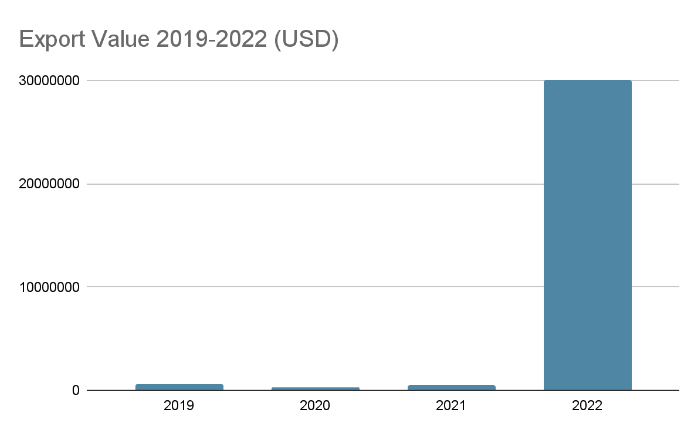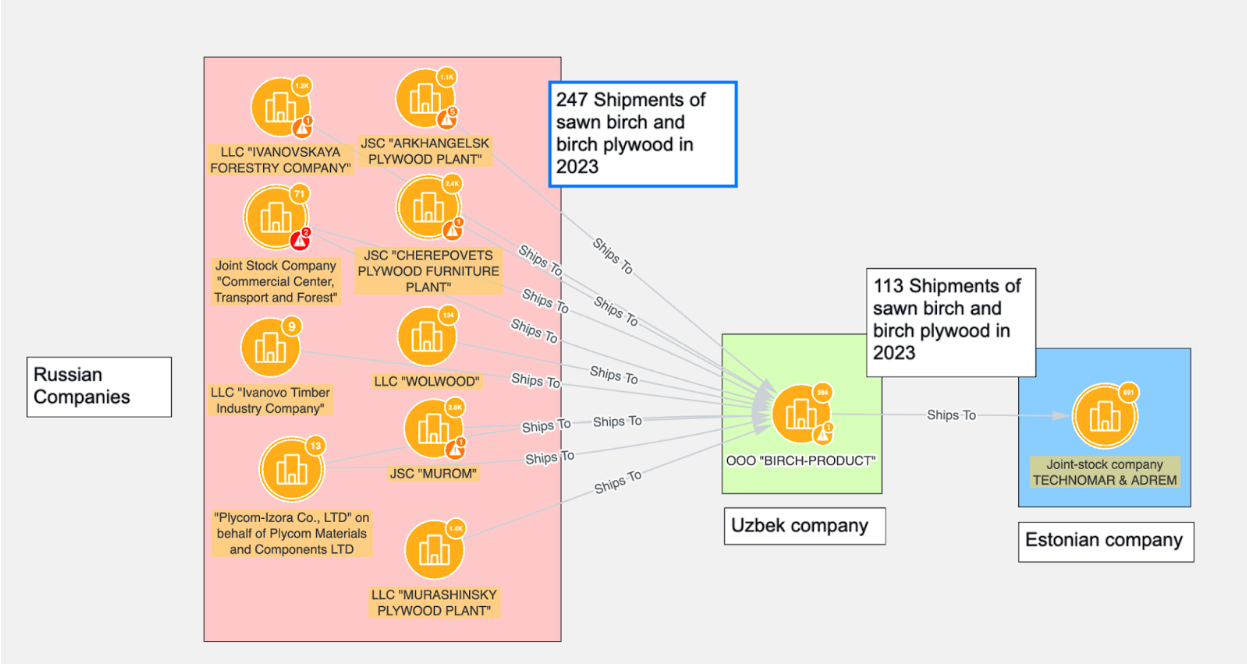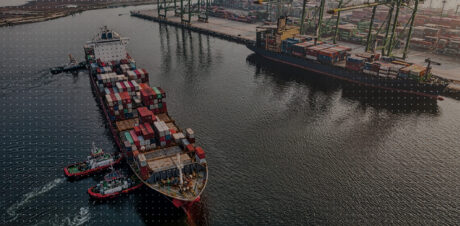In July 2022, the European Union banned imports of wood from Russia in an attempt to increase the economic cost of Russia’s invasion of Ukraine. Since the ban, exports of timber from Central Asia, a region with little forest and a minimal timber industry, have skyrocketed. Moreover, trade records indicate that the bulk of these exports are being shipped to EU member states, particularly Poland, Latvia, Czechia, and Bulgaria.

Fig 1: Exports of plywood (HS 4412) from Kazakhstan, 2019-2022. Source: UN Comtrade
The sudden exponential increase in timber exports from Central Asian countries like Kazakhstan and Uzbekistan suggests that timber is being routed from Russia through Central Asia on its journey to Europe, enabling Russian companies to obfuscate the illegal origins of their timber while still generating wealth for the Russian economy and its $12 billion timber industry.
<<Read Sayari’s full analysis of Kazahk timber exports with illicit ties to Russia and Belarus.>>
Efforts by Russian companies to obfuscate the ultimate origin of their timber will increase the risk for EU importers who, pursuant to the post-invasion timber ban and the EU Deforestation Regulation, are prohibited from importing timber or timber products with inputs sourced back to Russia.
However, trade and corporate data available in Sayari Graph show how European importers can get ahead of the problem by identifying the entities in their supply chains with the highest risk of links back to Russia.
Transshipment in Uzbekistan
Trade data available in Sayari Graph illuminates potential transshipment of Russian timber through Uzbekistan on its way to Europe.
In 2023, Uzbekistan-registered Birch Product LLC received shipments of sawn birch and birch plywood from several Russian companies, four of which are Russian government contractors and one of which is a sea terminal that is sanctioned by Ukraine for its role in facilitating the war. Birch Product LLC in turn exported shipments of sawn birch and birch plywood throughout 2023 to Technomar & Adrem AS, a plywood and timber processing company registered in Estonia, an EU nation.
The same category of goods being shipped to and from Uzbekistan suggests that Birch Product LLC is being used to evade the EU ban on Russian timber. Additionally, Birch Product LLC was registered in August 2022, one month after the timber ban. As seen in other cases, incorporation soon after the onset of relevant controls can be an indicator of import or export control evasion, when present with other factors.

Fig 2: A diagram showing the flow of banned Russian timber through Uzbekistan into EU member state Estonia, visualized in Sayari Graph.
Connections to Sanctioned Russian Timber Oligarch in Kazakhstan Timber Exports
Corporate data available in Sayari Graph can connect birch exported from Kazakhstan to a sanctioned Russian oligarch.
Semipalatinsky Woodworking Plant №1 (ТОО “Семипалатинский Деревообрабатывающий Завод №1″) “Semipalatinsky” exported at least 284 shipments of birch plywood from Kazakhstan in 2023. One of the two dealers that Semipalatinsky’s website names in Kazakhstan, RKD, can be linked to a sanctioned Russian oligarch using Russian corporate data.
RKD is a joint Russian-Kazakh timber company that, according to its website, is “the official representative of the companies Ilim Timber Industry LLC and Sveza” in Kazakhstan. Sveza is a Russian plywood manufacturer that is indirectly minority-owned by sanctioned Russian oligarch Alexei Mordashov. This link connects Semipalatinsky to sanctioned Russian entities, indicating that imports of Kazakh plywood produced by Semipalatinsky might be in violation of EU law banning Russian timber imports.

Fig 3: Sveza’s corporate connections to sanctioned Russian oligarch Alexey Mordashov, visualized in Sayari Graph.



